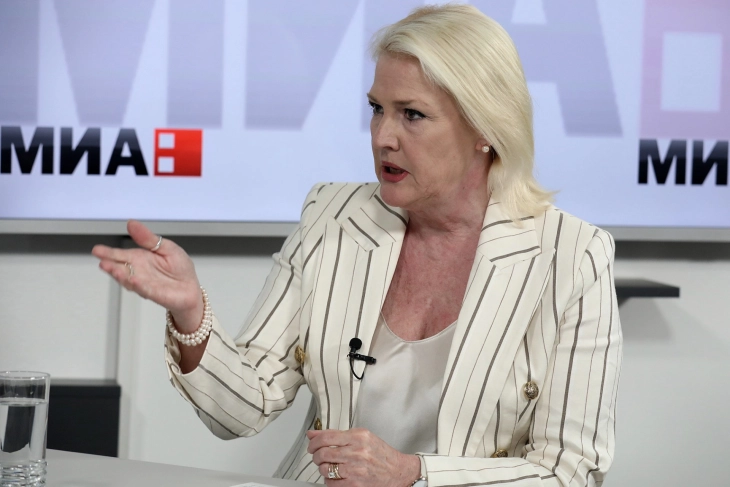Aggeler: Not surprised to see Grubi's name on U.S. "blacklist"
- U.S. Ambassador to North Macedonia, Angela Aggeler, said she was not surprised to see the name of former deputy prime minister Artan Grubi on the U.S. "blacklist" for involvement in significant corruption.

Skopje, 16 December 2024 (MIA) - U.S. Ambassador to North Macedonia, Angela Aggeler, said she was not surprised to see the name of former deputy prime minister Artan Grubi on the U.S. "blacklist" for involvement in significant corruption.
"No. And it would be my guess that there is probably no one in this country, amongst the citizens, amongst the judiciary, amongst anyone, who was surprised to see his name on the list. One of the things that has been consistently true is when the United States has announced the designation of an individual, and this is the same for judge Bexheti, nobody says - Oh my gosh, I can't believe it. Everyone knows in this country who is corrupt. And, frankly, this is something that we have been working closely with Washington D.C. to have processed. It has been many, many months. So, I was not at all surprised. I was very pleased, and I was very pleased that Washington was able to make the announcement on International Anti-Corruption Day - December 9. So, I was not surprised, I was pleased," Ambassador Aggeler said in an interview with Sloboden Pecat.
On the impression that usually high-ranking officials were added to the "blacklist" only after they left the office (as has been the case with Mijalkov, Gruevski, Angjushev, and now Grubi), and why these high-ranking officials were never put on the list while in office, Aggeler said it was not a decision, but a process question.
"It's not a decision. It's a process question. Washington works with embassies, with our Embassy here, for example, that helps put together a package of information on individuals that we believe locally have participated in criminal corruption. And then it's quite a lengthy process. So, the Embassy, or any embassy in the world can put together a package on an individual, and it could take many months to a couple of years, depending on the complications of the case. So, for us, it is never a political issue. I was asked if this was in response to various political activities over the course of the last week or months. And the answer is - no. That's not how our process works. It isn't our intention to become involved in the politics of it. So, if in his case, the case had been completed when he was still in office, then we absolutely would have released it at that time. But it was not. So it's merely processing question," Aggeler said, noting that for the U.S., officials don't have any kind of immunity while in office.
Asked whether it was possible to happen that the U.S., having given half a billion dollars to the judiciary and we all know the result, at some point say - we have given too much money, it is enough, Aggeler said it was possible, noting that she doesn't see that happening in the immediate future or the near future because strategic priorities here in North Macedonia are based on the strategic priorities and desires and wishes of the people of this country and their elected officials. She added that she is an optimist, and she believes that as these actions are taken, we're on the right path.
As regards reforms in judiciary and asked to comment on developments in the Judiciary Council after Vesna Dameva's resignation, she said that is an internal process, adding that her comments on the Judicial Council and the composition of the Judicial Council, the comments from the Prime Minister and others about changing membership or how that works have always been that this is a process that should be taken carefully and thoughtfully.
"And that is the same today as it was before. It's important that there is a Judicial Council that works to support the judiciary, that works as a balance on other aspects of the judiciary. We are here to support it as long as it is an institution of good will, and we'll be open to any discussions on how we can support that," Aggeler pointed out.
On whether she does not support dissolving of the Council completely as the Prime Minister proposed, she said it is not a decision for the U.S. Embassy.
"The reaction there was whatever action is taken, it is within his authority to do so. But, our recommendation, it's not so much of an opinion on whether or not he should do that, it's that any action that takes place should be done in a way that is thoughtful and that is clear and transparent, so that the people of this country understand why actions were taken and what the goal is for the whole Council. That's not a decision for us at the U.S. Embassy. We are here to support thoughtful decisions that affect the broader rule of law here," says the U.S. Ambassador.
According to her, full integration into the European Union is something that would be of great benefit for the country, and the important part of that is undertaking the reforms that are required for full membership within the European Union. As regards the constitutional changes which are the main condition for continuing the path to the EU, under the French proposal, and the way forward is the bilateral relationship with Bulgaria, she said: "Frankly, the politics, the domestic politics of it, in my mind I'm not sure they're worth waiting. So, it is my hope that this government finds a way to move forward as quickly as possible and to start making those reforms. I also understand that there are domestic considerations. And so it is not for me to dictate. I just hope that it happens sooner rather than later."
Photo: MIA archive







